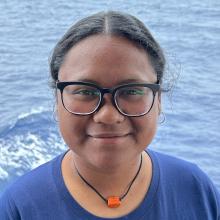
Elany Joseph
Tell us about your work/research. What kinds of things do you do?
At OneReef, I support youth activities that connect Palauan youth with the natural environment through fishing camps and events, transfer traditional fishing knowledge and practices, and reinforce stewardship principles. The shift from traditional fishing to a capitalist economy in Palau has decreased interaction with the environment and increased reliance on imported foods, affecting health and livelihoods. Preserving traditional fishing knowledge provides economic opportunities for local fishers, promotes cultural heritage, enhances environmental stewardship, and improves food security.
What sparked your initial interest in your career?
My initial interest in my career was sparked by my upbringing in a fishing family. Growing up, I was deeply involved in the practices and traditions of fishing, which provided a direct connection to the natural environment. Observing my family's sustainable fishing methods and their profound respect for marine ecosystems instilled in me a passion for marine conservation and sustainable practices. This early exposure made me realize the importance of preserving both the ecological balance and the cultural heritage associated with traditional fishing. This foundational experience fueled my desire to pursue a career where I could combine traditional knowledge with scientific approaches to promote environmental stewardship and community resilience.
Who influenced you or encouraged you the most?
My grandparents
What element of your work/study do you think is the most fascinating?
The most fascinating element of my work is the integration of traditional fishing knowledge with modern scientific approaches. This combination creates a holistic perspective that not only preserves cultural heritage but also enhances environmental stewardship and sustainability. Witnessing how these two seemingly different realms—ancient practices and contemporary science—can work together to promote ecological balance and resilience in coastal communities is incredibly rewarding. This fusion of knowledge not only provides practical solutions to current challenges but also fosters a deeper connection and respect for the natural world. The potential for innovative and culturally relevant solutions in this space is both exciting and inspiring.
What other jobs led you to your current career?
My journey to my current career as a volunteer working with fishers is deeply rooted in my upbringing and personal experiences. Growing up in a family of fishers, I was immersed in the practices and traditions of fishing from a young age. This early exposure instilled in me a profound appreciation for the intricate balance between humans and the natural environment, particularly the marine ecosystems that sustain us. My family's reliance on fishing for our daily sustenance provided me with firsthand knowledge of the skills, techniques, and traditional wisdom associated with sustainable fishing practices. I observed the meticulous methods my family employed to ensure that their fishing activities were not only productive but also environmentally responsible. This foundation of knowledge and respect for marine resources became the cornerstone of my passion for fisheries and environmental stewardship.
What are your degrees and certifications?
Bachelors in Diplomacy and International Relations
What are your hobbies?
I enjoy fishing
What advice would you give someone who wants to have a career like yours?
Leverage any personal or familial connection to fishing and the natural environment to provide invaluable insights for your career. Gain hands-on experience by volunteering with marine conservation organizations, participating in internships, and engaging in community-based projects. Respect and integrate traditional fishing knowledge with modern scientific approaches for effective and culturally sensitive solutions. Promote sustainable fishing practices, educate others about marine ecosystems and cultural heritage, and be prepared for the challenges and slow progress in environmental work. Connect with experts, join relevant organizations, and build a professional network to open doors to opportunities and collaborations.
Expeditions
Elany participated in the following Ocean Exploration Trust expeditions:
